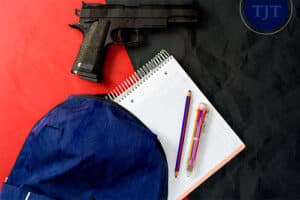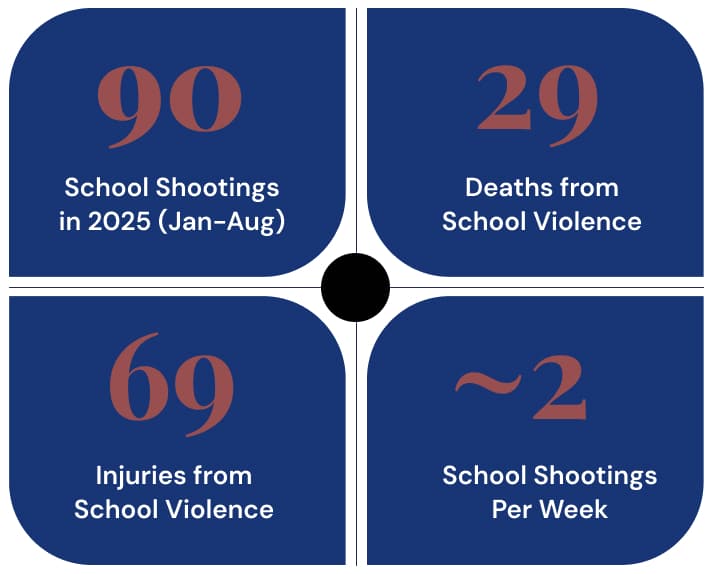How the Minneapolis School Shooting Reflects America’s Growing School Gun Violence Crisis
Balancing School Safety with Second Amendment Protections in New Jersey
Tormey Law Firm – New Jersey’s Gun Lawyer

Unfortunately, the Minneapolis violence highlights the necessity for preventative measures and clear legislation for the elimination of the menace of gun violence for the safety of communities. Through just over half of the year 2025, our country has already experienced 90 school shootings, which killed 29 and injured another 69. At nearly two school shootings per week, our nation’s youth are at risk.

Our firm represents persons who have inquiries and concerns regarding gun ownership and public safety. We strive for a balance between security and constitutional protections. With the delivery of seasoned legal advice, we advise our clients on what they can and cannot do, safeguarding their interests in matters related to guns.
Breaking Down New Jersey’s Firearms Statutes and School Safety Laws
New Jersey maintains some of the toughest firearms legislation within the United States, created for the safety of the community and ensuring the responsible and safe behavior of gun owners.
Gun-Free School Zone Laws (N.J.S.A. 2C:39-5)
Under N.J.S.A. 2C:39-5, it shall be unlawful for any person to knowingly possess a firearm within a school zone unless lawfully authorized. The statute applies school buildings and the school-purpose property, such as playgrounds and parking lots, and athletic fields. The only persons exempt from the prohibitions are law enforcement officers, security officers, and those expressly authorized in writing.
Stiffened Penalties for Gun Crimes Around Schools
New Jersey law also demands harsher penalties for weapons offenses occurring within or near schools, colleges, and other educational institutions. Carrying a firearm for an unlawful purpose, unlawful carrying without a permit, or use of a weapon for the purpose of committing another felony is taken more seriously when the felony is committed within or near a school. The focus is on preventing the carrying of weapons where the risk of danger to children and personnel is very high.
Extreme Risk Protective Orders (Red Flag Laws)
New Jersey adopted Extreme Risk Protective Orders (ERPOs), or “red flag” legislation, enabling courts to temporarily suspend a citizen’s right to possess firearms. When a family member, householder, or law enforcement officer submits an order to the courts, the citizen is compelled to surrender all firearms and is prohibited from newly purchasing them.
Teacher and Guidance Counselor Mandated Reporting Responsibility
State laws oblige teachers, school administrators, and school counselors to report threats or dangerous behaviors. As mandatory reporters for child abuse and neglect, teachers are also responsible for the reporting of threats of danger to the public, such as students who possess a weapon, make terrorist threats, or engage in overt violence. Not reporting an action can escalate into disaster and the district can become liable.
Statutory Requirements for Schools
Each district is required to carry out safety and security measures. This includes the writing of emergency operations strategies, the frequent performance of lockdown drills, and collaboration with law enforcement and first responders. State statute also requires schools to assign safety specialists to guarantee compliance. Noncompliance can leave districts vulnerable to both regulatory sanctions and civil liability for a failure to prepare.
Background Check Mandates and Potential Loopholes
New Jersey law mandates a Firearms Purchaser Identification Card (FPIC) or handgun purchase permit. Applicants are fingerprinted. Their criminal and mental health records are reviewed. Anyone who has a felony conviction related to domestic violence is unable to possess or buy a firearm. Additionally, those with restraining orders placed on them or who have been institutionalized involuntarily for mental health issues are also ineligible.
The system’s success relies on proper data entry by courts, hospitals, and law enforcement organizations. Failure to provide updated and accurate information can create a legal loophole, allowing a prohibited individual to purchase and own a weapon.
Safe Storage Laws and Parental Liability Laws
In New Jersey, handgun owners must keep guns in a securely locked container or trigger lock when the firearm is not under their direct control. The statute highlights households with children specifically because it understands the risk created whenever children or adolescents possess unchecked access to weapons. When a minor carries a handgun into school after having taken it from an unsecured home, the parents can be charged with a felony, civil liability, or both.
Mental Health Reporting and Privacy Issue Considerations
In addition, the firearm laws of New Jersey also cross over into mental health reporting laws. Courts and health providers are required to report certain adjudications and involuntary hospitalizations to mental health facilities, which are stored in state databases used for background checks. Schools and counselors work under further limitations. Federal privacy protections like the Family Educational Rights and Privacy Act (FERPA) and the Health Insurance Portability and Accountability Act (HIPAA) restrict what can be released without permission. This provides a balancing act where teachers and mental health therapists are very frequently the first people who identify concerning conduct. Legal interpretation is often necessary to ensure compliance while upholding the rights of students.
Post-Incident Legal Challenges: Criminal Defense and Civil Liability
Liability Under New Jersey Tort Law
There are affirmative duties on New Jersey districts and schools to provide a reasonably safe learning facility for students. When a shooting or some other violent incident occurs, plaintiffs assert that a failure to follow proper security protocols, failure to heed red flags, or failure to report possible threats makes schools liable. School immunities are present for certain purposes under the New Jersey Tort Claims Act, but they are never absolute. The court will ask if the district was reckless or negligent, and if proper measures to prevent foreseeable harm were not undertaken, a liability may result. Staff and administrators may be personally liable if their actions exceed their official capacity.
Claims and Coverage Limits Insurance
Following a violent attack, schools frequently look to their insurance policies to fund the costs of medicine, damages to buildings, and claims for damages. Coverage is by no means limitless, however. Policies often exclude intentional actions, criminal activity, or specified types of negligence. The districts may be forced to turn to a mix of general liability insurance, educators’ legal liability policies, and specialized coverage for school violence.
Criminal Defense Implications
Occasionally, a crime may be charged against more than one party. Minors who are suspected of bringing firearms to class or who are perpetrators of violent crimes must be defended, as must their parents who are charged under parental liability or firearms storage statutes. Teachers or administrators are criminal targets also if they are in breach of mandatory reporting requirements. The districts themselves cannot be charged with a crime, but their staff can.
Civil Litigation and Possible Damages
Civil suits often follow violent attacks or school shootings also the victims’ families might bring claims for wrongful death, personal injury, or emotional distress. They may sue for both economic and non-economic damages. Negligent supervision, negligent hiring or retention of employees, or failure to implement safety measures are some of the claims made by plaintiffs in a civil suit.
New Legislative Requirements: School Safety Mandates and Compliance
New Jersey has recently passed legislative actions that have a direct effect on school safety and gun regulations. The 2022 legislation mandated that each public school develop a threat-assessment team. Beginning in the 2023–24 school year, each district and charter school must appoint a multidisciplinary team responsible for flagging potential violence. The legislation invites schools and school leadership to take on a more proactive role. By placing emphasis on behavioral and psychological intervention, as opposed to criminal enforcement, this legislation allows for a more comprehensive solution. Schools are also required to have specified monthly drills that stage security exercises and lockdowns. One drill per year is required to be conducted with local law enforcement.
The majority of incidents fall within the state’s authority but federal codes may be relevant in specific situations, such as the Gun-Free School Zones Act and this law governs the possession of firearms in and around educational institutions.

Schools are required to develop written plans that include evacuation, lockdown, reunification, and medical coordination procedures. Protocols should include information on who may invoke emergency action and how school staff will coordinate with emergency responders and this requires aligning policies with statutory requirements, training staff, monitoring compliance, and documenting all actions taken. Districts must also remain attentive to changes in federal law and court rulings, which may alter the legal environment for firearm restrictions and school safety measures.
Experienced NJ Gun Rights Defense Protecting Your Constitutional Rights
Our years of experience in criminal defense, has gained us a high level of recognition for handling weapon-related matters, such as weapons in or around a school zone and weapons near a school. Our lawyers are aware of the distinct dynamics surrounding the current gun laws. Our lawyers protect our client’s constitutional rights and limit enduring penalties.
We guide clients through compliance requirements, coordinate with law enforcement and schools as necessary, and provide families with resources such as counseling, crisis response, and victim advocacy. Combining legal defense with compassionate guidance, we stabilize and fortify our clients with resolve. To ensure accessibility is available when it is most needed, our firm provides consultation services around the clock. Emergencies are open 24/7 and so are we. Our lawyers are available 24/7 to address immediate questions and provide instant legal advice. We are also available for a free initial consultation, allowing clients to get a sense of their legal footing, explore some defense strategies, and determine the best course ahead with no financial stress. Whether you are in the middle of a continuing investigation, just arrested, or suspect a lack of compliance, we are prepared to be right by your side at every turn.
Contact us at (201)-614-2474 or request your complimentary consultation to address your firearm-related legal matters. Our experienced New Jersey gun defense attorneys are ready to protect your rights
